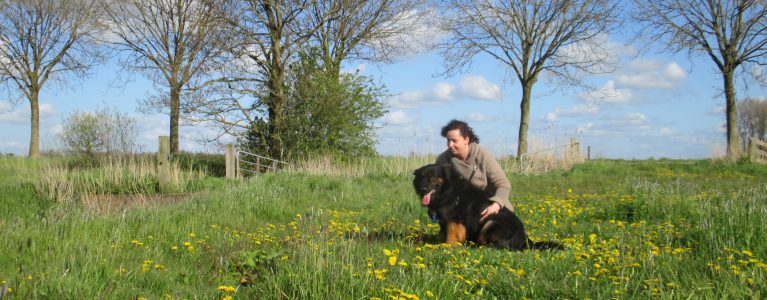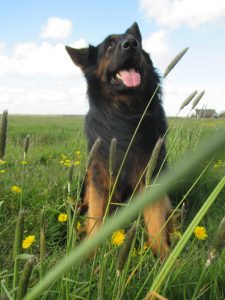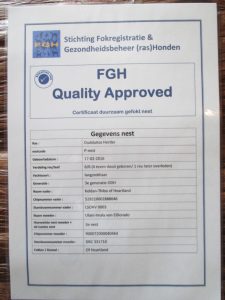
 It’s a sunny day in Spring when we arrive at the farmhouse of AnneMarie van Krimpen, in the north of the Netherlands. On our arrival we are greeted by the cheerful barking of the old German shepherd dogs. Inside her home are some more dogs, who look up curious and eager to the visitor. “They’ll be quiet in a moment,” AnneMarie says from the kitchen where she makes a cup of tea.
It’s a sunny day in Spring when we arrive at the farmhouse of AnneMarie van Krimpen, in the north of the Netherlands. On our arrival we are greeted by the cheerful barking of the old German shepherd dogs. Inside her home are some more dogs, who look up curious and eager to the visitor. “They’ll be quiet in a moment,” AnneMarie says from the kitchen where she makes a cup of tea.
AnneMarie van Krimpen is co-founder of the Stichting Fokregistratie & Gezondheidsbeheer (ras)Honden (FGH) (Foundation Breeding Registration & Health Administration (pedigree) Dogs). Together with Rob Hoekstra she founded this foundation. AnneMarie: “We started from the association of old German shepherds. These breedclubs are not accredited. We noticed people mainly look at the appearances of the dogs, but not to their health. The show results seem to be leading for the choice to breed with certain dogs. I love to do a show with my dog Enon, but those results should not be related to dog breeding. This increases the risk of genetic disorders, whereas it should be central to health.”
Unfortunately AnneMarie has experienced genetic disorders with one of her dogs. “My first old German shepherd was Kaya. She had a very good character. She often accompanied me to dog training, where she was an example to the other dogs and their owners. But she wasn’t healthy. I had a monthly subscription at the vet. That made me curious about her lineage.”
As a veterinary assistent and experienced dog groomer, she didn’t see these problems just with her own dog, but also with other breeds. She started to delve into the health and lineage of dogs. First just for her own association of old German shepherds, where she met co-founder Rob Hoekstra. Then together they decided to raise their broader vision of a healthier dog and to bring other (pedigree) dogs into their research.
The FGH Foundation has set itself the goal of improving the health of dogs and to reduce inbreeding. They started this professionally with a team of specialists. Now more and more (pedigree) dog associations and individual breeders affiliated with the foundation. They give information about their dogs, and the foundation checks this information and asks for more input if necessary. This leads up to this point where 800,000 dogs of all breeds are registered in their database. The lineage and health of the dogs are the focus point. AnneMarie: “We strive to provide health information of as many dogs as possible. We ask breeders to do DNA tests on breed specific genetic disorders. Which tests those are can vary for each breed. To know which tests breeders can do, we check a pedigree advisor of the Dutch Stichting Dier&Recht (Foundation Animal&Right), but we also do research on our own data to check which disorders have been of influence in the past.”
To analyze their data the foundation get regular help from geneticists of Genetic Councelling Services (GCS). They researched complete dog breeds, such as the Czech breed Chodsky Pes. They found many genetic disorders. AnneMarie: “In the Czech Republic, they only check out four generations. If you approach this breed like this, it seems to do well on subjects like health issues and hereditary. But if you look a bit further into five of six generations, you’ll start to see the real issues. Especially in the ‘60’s till ‘90’s we found lots of health issues. In this period, people used to breed with show champions a lot. That resulted in lots of brother-sister and parent-child breeding pairs. The inbreeding percentages got way to high. A higher inbreeding percentage increases everything: the beauty, but also health issues.”
According to AnneMarie outcrossing is the short term solution. “We research lineage. But when there’s too much inbreeding, outcrossing is the only way to make the dogs healthy. To qualify for outcrossing, we select dogs based on their health. Every dog has it’s DNA tested on genetic disorders. Also the looks of the dog are important. If everything matches, we create a breeding program. The combination of the Chodsky Pes with an Altdeutsche Hütehund is an example of a look-a-like pair. The inbreeding percentages decreases immediately after the first outcross. Then we choose to breed the dog back to it’s own breed, or to do a second outcross to reduce inbreeding and to increase positive health characteristics. Some outcross dogs look exactly like the breed you like to preserve. The different will only be visible in the DNA, because the genetic pool has broadened. That decreases the risk of health issues.” The ideal of AnneMarie would be to open up all herd books and pedigrees for outcrossing: “Breeders have to dare this. But it has many advantages. You can breed dogs with the best health characteristics for a better variety and healthier breed.”
 To improve awareness of healthy dogs among breeders and buyers of pups, the FGH Foundation has developed its own quality mark: Quality Approved. This mark is only available for nests, not for breeders. AnneMarie: “People consciously choose a healthy dog. But many times, they bare the knowledge to judge this the right way. That’s why we only provide this quality mark if the breeder can prove that his nest consists of healthy dogs without hereditary defects. The breeder proves this with health tests, relationship data, a description of the birth and growth of the nest. He must also inform puppy buyers well. Those restrictions mean that one breeder can have both a Quality Approved nest and a nest without this mark.” Pup buyers get a kind of guarantee of the health of their animals in the form of a purchase agreement.
To improve awareness of healthy dogs among breeders and buyers of pups, the FGH Foundation has developed its own quality mark: Quality Approved. This mark is only available for nests, not for breeders. AnneMarie: “People consciously choose a healthy dog. But many times, they bare the knowledge to judge this the right way. That’s why we only provide this quality mark if the breeder can prove that his nest consists of healthy dogs without hereditary defects. The breeder proves this with health tests, relationship data, a description of the birth and growth of the nest. He must also inform puppy buyers well. Those restrictions mean that one breeder can have both a Quality Approved nest and a nest without this mark.” Pup buyers get a kind of guarantee of the health of their animals in the form of a purchase agreement.
Besides their own central registration of dogs and analyzing all data, the foundation also educates breeders. AnneMarie: “We understand the issues that breeders are facing. Choosing the health of your animals can have some disadvantages. For example, after an outcross with your dog, this nest isn’t allowed to compete at national shows. There’s also the tradition to stick to purebreds. We don’t blame breeders for anything, but we like to give them information and presentations, so together we can choose the health of dogs.”
At the end of our visit we go outside for a walk with her dog Enon. AnneMarie lets him go at the vast meadows around her home. He runs, rolls through the grass and returns to his boss every now and then, before he runs off again. After a short while Enon comes back satisfied, with his tongue out of his mouth and wagging his tail. After my departure, AnneMarie continues her work on the computer. “We have about 200,000 dogs who still need to be in the database of ZooEasy.” She’s a night owl, who will do anything to complete all the available information. “My dream is to make history with better health of all dogs.”